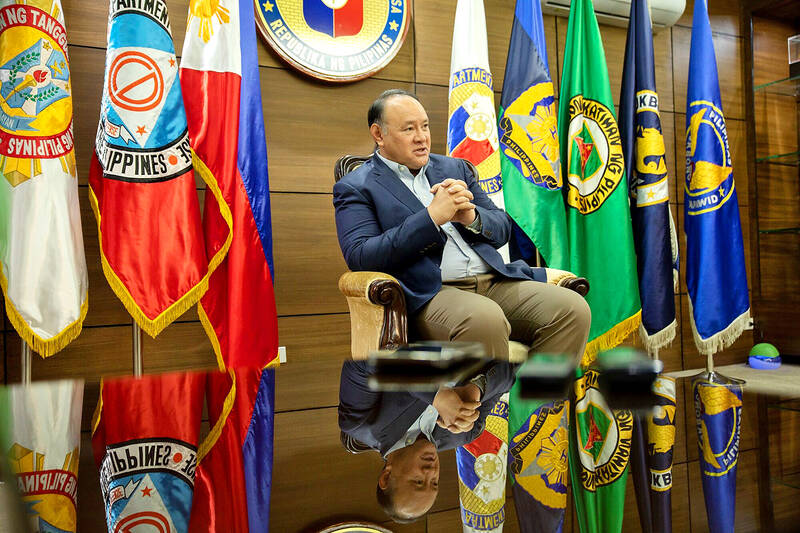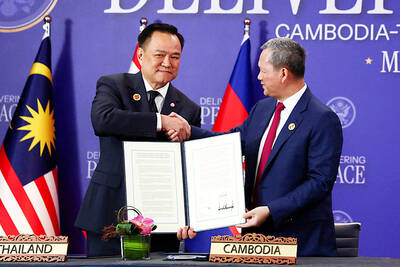The Philippines is building defense alliances with the US and other security partners to help pave the way for resource exploration in the oil-and-gas-rich South China Sea, the nation’s top defense official said, amid heightened tensions with Beijing.
“I really do think it’s quite urgent that we start now,” Philippine Secretary of Defense Gilberto Teodoro Jr said in an interview with Bloomberg News on Wednesday in his office in Quezon City, Metro Manila.
While he declined to provide details, Teodoro, 59, said that resource exploration is “part of the package” of the Philippines’ strategy in fighting for its territory.

Photo: Bloomberg
His comments suggest that energy exploration could well be the next flashpoint in the territorial disputes in the South China Sea, where Beijing has laid a sweeping claim opposed by countries, including Taiwan and the Philippines, and rejected by an international tribunal in 2016.
The Philippines, which imports almost all its fuel requirements, has been trying to start energy exploration in its territorial waters as a key local gas field nears depletion.
That bid had been largely foiled by the maritime dispute with China, which routinely deploys ships in the contested waters.
Beijing’s agenda in the South China Sea might also be spurred by energy interests, Teodoro said.
“This could mean that they really want total domination and control over everything from free passage to resources, or they want to bear hug the Philippines to make them the sole joint venture partner in the exploration or exploitation of resources in this area,” Teodoro said.
“Their legal position is untenable and has been rejected by the whole world,” he said.
Philippine President Ferdinand Marcos Jr had lately stepped up a push to end the deadlock in negotiations in South China Sea resource exploration, almost a year since he met his Chinese counterpart, Xi Jinping (習近平), and agreed to jointly pursue discussions.
Since that meeting in Beijing in January last year, relations between the two neighbors have become rocky, marked by increasingly dangerous encounters at sea.
The Philippines will not allow any joint exploration that does not recognize the nation’s right to exclusively exploit these resources, Teodoro said.
“Our role really is to secure the territorial integrity and sovereignty of the Philippines, and to protect as much as we can the peaceful and unimpeded exploitation by Filipinos and legally allowable entities,” said Teodoro, a lawyer by training and a one-time presidential contender.
In the face of a “more aggressive” China, the Southeast Asian nation is also planning “more robust” military activities with the US and its allies, Teodoro said, describing Manila’s alliance with Washington as “extremely strong.”
Early last year, the Philippines agreed to expand US access to military bases near Taiwan and the South China Sea.
The Philippines is also expanding ties with “other allies and like-minded countries,” including Australia, Japan, the UK and Canada. As the US heads into a crucial election in November, Teodoro hoped that Washington’s defense strategy in the Indo-Pacific would not waver.
“A lot has been invested already on both sides,” he said, referring to the US and Philippine engagements.
Ensuring security in the Indo-Pacific region and rights of passage in the vital trade route benefits not only the US and its allies, but the entire global economy, he said.
Tensions escalated in the past few months as Philippine and Chinese ships faced off in the contested waters.
Teodoro said that what worries him the most about the dispute is “the possibility of a miscalculation or a conflict.”
“You’re dealing with a country without any openness, with opaqueness, with unpredictability, with no external indicators to show what its next move will be,” he said of China.
As a result, countries like the Philippines have to be prepared all the time, which Teodoro said has kept him busy “hardening and building up our alliances” in line with Marcos’ foreign policy stance.

Shamans in Peru on Monday gathered for an annual New Year’s ritual where they made predictions for the year to come, including illness for US President Donald Trump and the downfall of Venezuelan President Nicolas Maduro. “The United States should prepare itself because Donald Trump will fall seriously ill,” Juan de Dios Garcia proclaimed as he gathered with other shamans on a beach in southern Lima, dressed in traditional Andean ponchos and headdresses, and sprinkling flowers on the sand. The shamans carried large posters of world leaders, over which they crossed swords and burned incense, some of which they stomped on. In this

‘NO COUNTRY BUMPKIN’: The judge rejected arguments that former prime minister Najib Razak was an unwitting victim, saying Najib took steps to protect his position Imprisoned former Malaysian prime minister Najib Razak was yesterday convicted, following a corruption trial tied to multibillion-dollar looting of the 1Malaysia Development Berhad (1MDB) state investment fund. The nation’s high court found Najib, 72, guilty on four counts of abuse of power and 21 charges of money laundering related to more than US$700 million channeled into his personal bank accounts from the 1MDB fund. Najib denied any wrongdoing, and maintained the funds were a political donation from Saudi Arabia and that he had been misled by rogue financiers led by businessman Low Taek Jho. Low, thought to be the scandal’s mastermind, remains

Near the entrance to the Panama Canal, a monument to China’s contributions to the interoceanic waterway was torn down on Saturday night by order of local authorities. The move comes as US President Donald Trump has made threats in the past few months to retake control of the canal, claiming Beijing has too much influence in its operations. In a surprising move that has been criticized by leaders in Panama and China, the mayor’s office of the locality of Arraijan ordered the demolition of the monument built in 2004 to symbolize friendship between the countries. The mayor’s office said in

FIGHTING CONTINUES: Thai military dropped 40 bombs on border areas, Cambodia said, while Bangkok said Phnom Penh launched heavy attacks and damaged homes Cambodia yesterday accused Thailand of intensifying its bombardment of disputed border areas, even as officials from the two countries attend a multi-day meeting aimed at negotiating an end to deadly clashes. The neighbors’ long-standing border conflict reignited this month, shattering an earlier truce and killing more than 40 people, according to official counts. About 1 million people have also been displaced. Cambodian and Thai officials were in their third day of talks at a border checkpoint, with ministers of defense from the two countries scheduled to meet today. However, the Cambodian Ministry of National Defense said Thailand’s military carried out a heavy